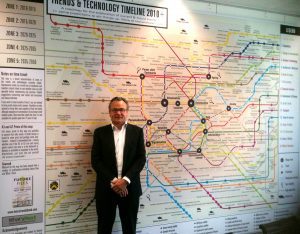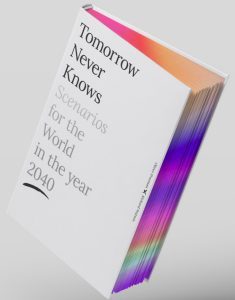Richard Watson: author, keynote speaker, futurologist
The world-renowned futurologist studied politics, philosophy and economics. Richard Watson is the futurist-in-residence at the Entrepreneurship. Centre of Cambridge Judge Business School (CBJS), one of the most prestigious business schools in the world. On his website “What’s next” he documents global trends and provides groundbreaking thinking tools for disruption, innovation and transformation.
Richard Watson: Keynote-Speaker und Scenario Planner
As a keynote speaker on trends and technologies, he was a guest of "global players", including IBM, Nestlé and Toyota. As a speaker in German-speaking countries, he inspired audiences at Audi, PricewaterhouseCoopers (PwC), Herbert Smith Freehills LLP and Porsche Holding in Salzburg, among others. One of his core topics is scenario planning.
Richard Watson: Author and Networker
The author of five books on the subject of the future and "What's next blogger" is visiting lecturer at Imperial College Business School and London Business School. As a co-founder of Thinking Allowed, a 24-hour retreat, he aims to reinvigorate the quality of discourse and debates in leadership teams.
How Richard Watson invented the 2050 MegaTrend map
Notes, magazines, online articles, newspaper clippings, bookmarks and more: Richard Watson could no longer find his way around in his own research. A productive further development of research results was becoming time consuming and frustrating. Showing meaningful connections seemed impossible. So the futurologist began to organize the analogue and digital chaos.
Richard Watson, the "What's next" pioneer
He started collecting his information on the "What's next" website. The connections, links and overlaps of the individual topics should become visible. Richard Watson wanted to be able to share his knowledge with others and stimulate the dialogue about the trends and technologies of the future. Modelled on the London underground map, he designed the 2050 MegaTrend map, which is one of the most important international tools for business innovation today.
The special thing about the 2050 MegaTrend map
A multidimensional source of inspiration
The 2050 MegaTrend map is much more than a linear representation of megatrends. Along the 16 trend lines, from work and society, through transport to economy and the environment, are stations that show the current status and the subsequent possible developments. Richard Watson visualizes what is now, what could be tomorrow, counter trends, game changers, opportunities and risks as well as the rise and fall of individual industries, products or areas of life. In this respect, the 2050 MegaTrend map is a multidimensional source of inspiration and a structured interface for both the start and the modification of innovation projects.
to the top of the pageRichard Watson: Keynote-Speaker und Scenario Planner
As a keynote speaker on trends and technologies, he was a guest of “global players”, including IBM, Nestlé and Toyota. As a speaker in German-speaking countries, he inspired audiences at Audi, PricewaterhouseCoopers (PwC), Herbert Smith Freehills LLP and Porsche Holding in Salzburg, among others. One of his core topics is scenario planning.
Richard Watson: Author and Networker
The author of five books on the subject of the future and “What’s next blogger” is visiting lecturer at Imperial College Business School and London Business School. As a co-founder of Thinking Allowed, a 24-hour retreat, he aims to reinvigorate the quality of discourse and debates in leadership teams.
How Richard Watson invented the 2050 MegaTrend map
Notes, magazines, online articles, newspaper clippings, bookmarks and more: Richard Watson could no longer find his way around in his own research. A productive further development of research results was becoming time consuming and frustrating. Showing meaningful connections seemed impossible. So the futurologist began to organize the analogue and digital chaos.
Richard Watson, the “What’s next” pioneer
He started collecting his information on the “What’s next” website. The connections, links and overlaps of the individual topics should become visible. Richard Watson wanted to be able to share his knowledge with others and stimulate the dialogue about the trends and technologies of the future. Modelled on the London underground map, he designed the 2050 MegaTrend map, which is one of the most important international tools for business innovation today.
The special thing about the 2050 MegaTrend map
A multidimensional source of inspiration
The 2050 MegaTrend map is much more than a linear representation of megatrends. Along the 16 trend lines, from work and society, through transport to economy and the environment, are stations that show the current status and the subsequent possible developments. Richard Watson visualizes what is now, what could be tomorrow, counter trends, game changers, opportunities and risks as well as the rise and fall of individual industries, products or areas of life. In this respect, the 2050 MegaTrend map is a multidimensional source of inspiration and a structured interface for both the start and the modification of innovation projects.
Questions and Answers with Futurologist Richard Watson
What's next?! Richard Watson on motivation, mindset and options
1. As a futurologist, you travel around the world. Where did you find the most pronounced "welcoming culture" for disruption, innovation and transformation?
Richard Watson
I experienced the greatest openness in the USA. In other countries, the willingness to change is certainly also growing.
2. Is the fear of change in other countries as great as it is in Germany?
Richard Watson
Definitely, although I perceive differences in this regard in the various age groups.
3. Do you have any tips to reduce this fear?
Richard Watson
The best advice: don't panic! Of course there are a few issues, such as the population getting older, or the fact that we are still deeply rooted in ideas about traditional manufacturing methods. Still, there is nothing to be afraid of. I think the trend will be towards regional and man-made.
4. Why did you invent the 2050 MegaTrends map?
Richard Watson
In the beginning I just wanted to sort out my own mess. I wanted to structure my research and notes and, above all, the connections and nodes of my research results for myself, because I just couldn't find anything. Then I thought it would be good to be able to share my overview with others. This resulted in the website "What's next" and my thinking tools, such as the 2050 MegaTrend map. I can just think better in pictures and colors.
5. Could you be completely wrong with the 2050 MegaTrend map?
Richard Watson
Of course I could! The 2050 MegaTrend is merely a map of possible routes forward. My intention was that it should start a discussion. It wasn't about being right, although I doubt that the 2050 MegaTrend map is 100% wrong.
6. Has the invention of the 2050 MegaTrends map changed anything for you?
Richard Watson
Not really. Maybe I'm a little more concerned now that humans might love machines more than humans?
7. If you want to develop new ideas, e.g. for products: is it really necessary to include megatrends?
Richard Watson
That depends on the time horizons. If you want your new product or service to be on the market in one to three years, it would be very important, and quite important in three to five years. If you plan to be marketable in ten years or more, you can neglect some aspects, such as current technology.
8. If you include the 2050 MegaTrends map in the development? What are the first steps?
Richard Watson
Pick two or three trends that overlap. You could combine these with one another and think about whether and what your company could achieve in this area. For example, you could link the following trends: the population is getting older (demographic change), more and more people are living alone (increase in single households) and internet-based health care (e-health) for diagnosis, therapy and monitoring of the 65+ generation.
9. "Anyone who has visions should see a doctor". With this sentence, one of our former Chancellors, Helmut Schmidt, shaped the German corporate culture. What mindset do you need for innovation?
Richard Watson
I remember him, although not the quote. Innovators need a vision of the future - a vision of where the world is going or where they would like to go. It’s that other quote: “you cannot predict but you can invent” (see). Leadership is all about having a vision for the future and taking people along on the journey with you - often through story telling (e.g. the unification of Germany perhaps).
10. How can companies create an environment in which the best ideas grow?
Richard Watson
Not many can. There is a tension in large companies between safety and conservatively growing and not making risking bets. That’s why, in my opinion, most true innovation comes from start-ups not large industry leaders/incumbents. (See Thomas Kuhn "the structure of scientific revolutions"). He says breakthroughs come from young people, accidents and cross-fertilisation of disciplines from memory.
11. Which subway line on your MegaTrend map are you currently using?
Richard Watson
Anxiety or mental health, which was an issue before the pandemic. The pandemic only made it worse. I think one of the main themes of the 21st century will be loneliness and isolation, which is ironic when you consider that everyone is (at least) technically connected to everyone. But maybe that's the problem. Loneliness and isolation create a strong desire for simplicity and permanence.
Many thanks for your time! Interview conducted by Gesine Cody (innoXperts® Strategy, Communication & Senior Copy Writer)
Tomorrow never knows: Scenarios for the world in the year 2040.
In 2012, Richard Watson and Oliver Freeman predicted a high probability of a global pandemic occurring. In the revised booklet they highlight their results from back then. The authors' analysis is based on the QUEST method (questions, environments, scenarios, transformations), which the authors developed together with the Australian visionaries Neville Freeman Agency. They ask questions, describe framework conditions and scenarios and describe possible transformations.
Watson and Freeman use the QUEST method as a microscope to study the areas of life that (will) change: nature, technology, society, politics, culture and economy. What opportunities arise from this, among other things, for a fundamental paradigm shift for #strategic planning? How will the pandemic shift national borders? After the pandemic-related isolation, will we turn away from a lot of "me" and orientate ourselves towards more "we"?
The understandable and therefore accessible language is particularly appealing. The well-founded analysis paired with humorous allusions to the Bible, the Beatles or the B52's is particularly impressive. Easy to read, sometimes difficult to digest and always optimistic. A great suggestion for anyone who wants to know how to deal with change./
Many thanks to Richard Watson for allowing us to make the booklet available on our website.
Tomorrow never knows: Scenarios for the World in the year 2040 by Richard Watson and Oliver Freeman with Neville Freeman Agency: Download the booklet here (PDF).
The current book by Richard Watson
"DIGITAL VS HUMAN: How We'll Live, Love, and Think in the Future"SCRIBE PUBN (August 7th 2018)ISBN-10: 1947534009, ISBN-13: 9781947534001
All books by Richard Watson are available at Future Trends.
Download the "2050 MegaTrend map" here
Click to download the "2050 MegaTrend map" here (PDF).
Further informations
- Consulting, Keynotes, Blog and Thinking tools by futurist, author, speaker and scenario planner Richard Watson on What's next
- Richard Watson on LinkedIn
- "Looking ahead": The Cambridge Judge Business School (CBJS) about Richard Watson
- Richard Watson interviewed by Louise Walsh in "This Cambridge Life", June 10th 2021: The futurist who'd like the future to slow down – just a little
- Richard Watson interviewed by Maria Franzoni, Speaking Business Academy: Podcast with Richard Watson
- Richard Watson in Wikipedia
- Richard Watson is visiting lecturer at Imperial College Business School TechForesight
- "You cannot predict but you can invent it" Who coined the saying? Dennis Gabor, Abraham Lincoln or Alan Kay? Check the quote investigator here



